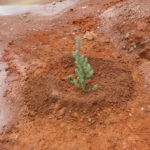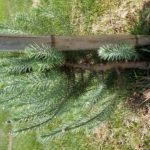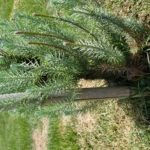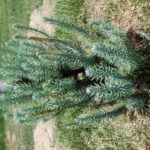Q.Growth pace – Pinus Pinea
Dear friend.
I planted a pinus pinea from seed and after a year I transplanted it to the permanente área. This coming April (2019), it will be a year since I transplanted, which brings me to the question. I think the plant is not growing fast enough. It seems that the plant is stuck growing the leaves, but the main branch is not raising straight or tall. Is it the normal pace this tree grows or is there anything wrong with my plant/soil? I am uploading a few pictures of the tree.
Thanks for your attention and kind help.
Renato

Hi Don.
Thank you for your prompt reply and very helpful and kind advices.
You are absolutely right; I am trying to defy nature. I while back when I was in Italy I fell in love with the shape and height of the stone pine tree and so I decided to take a risk. I did find online the temperature zone graphic that was not favorable to my region, but I took into account that (I am stubborn), there are a few Pine species that grow in my region like: Pinus caribaea, Pinus chiapensis, Pinus elliottii, Pinus greggii, Pinus kesiya, Pinus maximinoi, Pinus oocarpa, Pinus palustris, Pinus patula, Pinus taeda, Pinus tecunumanii, Araucaria angustifolia, among others. Once again it is not so hot in my region (average temp is 75F degrees all year around with some 104 tops and a minimum of 53F).
Reading on another site, I found out that the Pinus pinea trees growing in New Zealand grow really slow during the first two years (they do develop nicely the root system first), but after that it just takes off. Just like you said on your previous message. I am wondering if this might be my case?
What is really bugging me about my tree is that the trunk was thickening for this almost year I transplanted it, but it was not growing tall enough. One could see on the pictures showed before that the internodes are really close to each other.
Well, you certainly spotted a few problems that I am taking care of straight away. First, watering. I was always relying on the rain water and for some periods the plant did not get water for almost a month, so now I am going to water it twice a week. Second, I agree that the grass/weeds were taking some of the nutrients and water away from the tree. Third, pruning. I did trim some of 25% of the extra bottom branches and used some Bordeaux mixture fungicide (copper(II) sulphate (CuSO4) and slaked lime (Ca(OH)2) to avoid diseases from entering in the plant. Fourth, after a year, it was time to use some extra limestone and fertilizer to the soil, plus humic acid and; Fitfth, I did cover the radius around the tree with wood chips, so I am hoping that these will keep the moisture for the tree root system and the plant will start developing faster now.
By the way, there was no damage of any kind to the top of the tree. The main apical branch is there, but slow growing. Just the side branches were growing faster than the main apical branch. That is really weird, but shall I let these side branches grow freely?
Another piece of information that I did not share before, was that I planted all of the seeds (after a month in the fridge) in a nice prepared soil and irrigated them very often, but I took almost 3.5 years to take them out of the plastic bag to the permanent area, so I am not so sure if this has any effect on the current plant, but if you check out the picture of when I transplanted the tree, the plant looked pretty nice, and the problem started after 6 months of transplantation.
Anyway, thank you once again for your inputs and let me please know if there is any extra advice based on the info above.
For your information, I am attaching a picture of the tree after I followed your advices. If you wish I could follow up the future developments, like in 6 months or a year’s time.
Kind regards.
Renato

Hi Renato, first of all you are trying to grow a temperate zone species of pine that is exotic to your country and climate. So you should not expect it to be a perfect world for your stone pine. As far as I know, no indigenous species of pine occurs in South America, the southern limit of pines in Central America being in Nicaragua. There must be some reasons for that in nature.
If you are determined to defy nature and give it a go, look first to the growing conditions, soil and water management.
In the first photo of the site at time of planting, it appears that the soil has moisture but is deficient in organic matter content. In the following photos there is grass right up to the tree. Grass is very competitive for water and nutrients. The grass in this case appears sparse and distressed and therefore indicates possible nutrient deficiencies and water deficit. If there is not enough water and nutrients for the grass, then there will be far less available for the pine tree.
If mine I would clear the grass in an area two meters radius from the tree trunk. Apply a slow release complete organic fertilizer and then mulch over the top with 6 -10 cm thick layer of organic matter, wood chips or compost. This mulch will help to retain soil moisture, suppress competing weed growth, and add to soil organic matter and bioligical activity. Deep water this mulched area once or twice a week during the dry season. Control the grass and other weeds that poke up through the mulch.
From the photos it appears that the tree may have been headed/topped or broken (or eaten by wildlife or livestock) at some time after the first photo was taken. If so, that would have suppressed apical growth and resulted in the dense branching and foliar growth that is currently visible in the later photos. You can select the strongest central leader to favor and thin out some of the others at the top. Don't prune more than 25%.
In any case, it looks relatively good considering the compromised growing conditions. Give it some time, as often a tree needs a year or two to establish a wide ranging root system for gathering water and nutrients and to get growing.
Don





